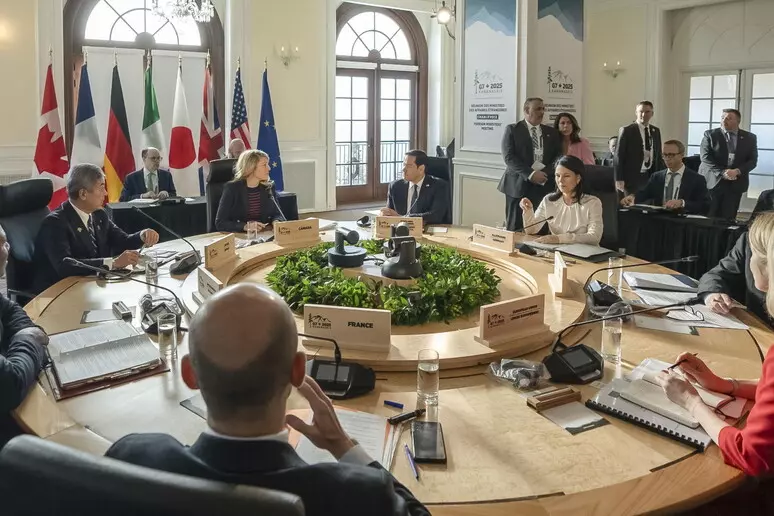In the end, amid smiles and public handshakes, the G7 foreign ministers’ summit in Canada ended with two compromises. On the one hand, the Trumpian pax, for which the United States had to accept the unwelcome commitment to upholding Ukraine’s territorial integrity while negotiating with Moscow. In return, the other Six states had to accept the White House’s “no” on the creation of the two states as a solution to the war between Israel and Hamas.
The final document highlights “unwavering support” for Kyiv and, most importantly, refers to the defense of its “territorial integrity,” words the White House did not like. Similarly, the G7 countries stressed how important to achieve “a just peace in line with the UN Charter” is and then added “Ukraine’s commitment to an immediate ceasefire.”
The summit ended ahead of schedule because the full Canadian delegation had to leave the proceedings to attend the swearing-in ceremony of Prime Minister Mark Carney, who took office on Friday to replace Justin Trudeau.
“The bilateral talks between the U.S. delegation and Canada’s delegation were very clear,” said Canadian Foreign Minister Melanie Joly. She added that she had total solidarity from the other representatives saying that many of the allies thought Trump’s comments were a joke. “I said to them, this is not a joke. Canadians are anxious. Canadians are proud people. And you are here in a sovereign country. So we don’t expect this to be even discussed and certainly, for us Canadians it’s a threat, it’s not a joke. I had a frank conversation with Rubio. Certainly, Canada’s sovereignty is not in question and we had a long conversation about tariffs and trade. Trump’s tariffs hurt not only us but also Americans. This is our message, this is our approach.” Canadians are also alarmed by Trump’s desire to bring Putin back into the G7. Russia was kicked out of the G8 after invading Crimea in 2014.
Rubio, on his first official trip to Canada and his first G7 event, heard complaints from his counterparts. Many, particularly the Japanese, appealed to him to use his influence with the president to avoid this trade war. However, Trump will not relent, the Secretary of State replied.
After three days of dinners and meetings, top diplomats from the United States, Britain, Canada, France, Germany, Italy, and Japan eventually signed the final communiqué. A persistent concern throughout the negotiations was that the unity of G7 had broken down because of the tariffs imposed by Trump.
Secretary of State Rubio tried to downplay the trade war launched by the White House by arguing that the tariff decisions should not be interpreted as hostile acts toward U.S. allies. “It is a friendly initiative and in support of our national interest as a country,” he said while glossing over reporters’ questions about annexation threats made by the White House chief for Canada and Greenland.
There was also a lot of talk about other issues, such as China and countering the so-called “shadow fleets” that Beijing allegedly created to cram in military equipment. The People’s Republic was asked to engage in “strategic discussions on reducing the risks of escalation” and to “promote stability through transparency.”
The ministers, except the U.S. which opposed it, called on the 8 Nordic and Baltic countries (Denmark, Estonia, Finland, Iceland, Latvia, Lithuania, Norway, and Sweden), to join the G7 in “a Shadow Fleet Task Force to improve monitoring and detection and otherwise limit the use of shadow fleets engaged in illegal, dangerous or environmentally hazardous activities, building on the work of others active in this area.”












